As long as businesses want to keep their hands clean, we will need a body like the CBI

As long as businesses want to outsource their dirty work to industry groups, they will need a body like the Confederation of British Industry, writes Simon Neville
The Confederation of Business Industry is sick. The question now remains: can the illness be treated or is it terminal for the lobby group?
Reading the coverage of a culture that looks more akin to a comic strip in the men’s magazine FHM than a serious business outfit, it is clear the CBI has lots to do to recover – if it ever will.
This week the British Insurance Brokers’ Association became the first group to publicly say it had cancelled its membership and the President of the CBI, Brian McBride said a “handful” of others had quit.
It is noticeable that the only named member to quit is itself another trade body and I would be very surprised if any individual company puts its head above the parapet to say it has left.
The reputational risk to a business saying it has left for moral grounds is to open itself up to scrutiny over its own internal affairs.
Any disgruntled employee reading that their bosses have said they want to distance themselves from the CBI because it is not upholding proper standards of business will inevitably lead to a phone call or three to a newspaper. Stories about hypocrites is every media organisation’s stock in trade and unless there is a quiet exodus, I think the CBI will survive.
This is because the role the CBI plays in supporting businesses is craved more than ever before.
Having written about businesses in the media and now advising companies on the media, it is clear we live in a time when firms are desperate to ensure they have full control of the spotlight and making sure it is primarily aimed elsewhere.
They will want the media to cover positive stories but approaches from journalists on broader topics that stray ever so slightly from the key messages they have developed will see them run a mile despite the importance of building relationships with the media in the good times and the bad.
That is where the CBI steps in. It has for years been the “voice” of business. Members pay their fees safe in the knowledge that if a pesky journalist calls them up, they can fob them off to a trade body.
“Oh, you want to discuss the price of eggs?” A supermarket could tell a journalist. “You need the poultry council or the eggs association,” they might say, undecided on who to call first.
Associations are everywhere and businesses love them because it outsources tricky situations around policy.
If Brexit taught us anything, an individual business clashing with the Conservative governments of the past decade is just not worth the hassle. Covering the retail sector at the time, it was clear virtually all businesses were pro-Remain but when trying to get any of them to speak on the record, they all declined as they were worried about the backlash.
On the Brexit issue, the CBI played the fall guy. It was highly vocal in its opposition to Brexit – representing the vast majority of its members – and UK businesses generally – who thought Brexit would be a disaster for trade and jobs.
Businesses continue to rely on trade bodies because they have seen it is a helpful foil and worth the fee.
To give a recent example, you may have noticed none of the big energy companies have been quoted on the new Ofgem rules on force fitting pre-pay meters in homes struggling with their bills.
Instead, the trade body Energy UK is rolled out. The banking sector, retailers, hospitality, property, insurance – they all fall back on their trade bodies.
As a result, it is unlikely that individual firms will cut ties with the CBI and prefer to stay quiet and hope the saga is resolved quickly. Other trade bodies may quit, but individual businesses will probably stay put.
The CBI has made faults in its communication strategy along the way in this scandal.
Brian McBride, the CBI President waited far too long to put himself up for interview and face proper scrutiny, the selection process for a new chief executive should have been public and not done behind closed doors and losing access to ministers in Whitehall will definitely hurt.
But, ultimately, the organisation will survive because members will shrug their shoulders and do what businesses do more and more – keep their heads down and hope the media will get bored.
The outrage will continue – lots of Brexiteers have long memories and resent the pushback the CBI gave during the Brexit referendum.
But loud noise from a vocal minority won’t be enough to make the CBI disappear whilst the subscriptions are still being paid.